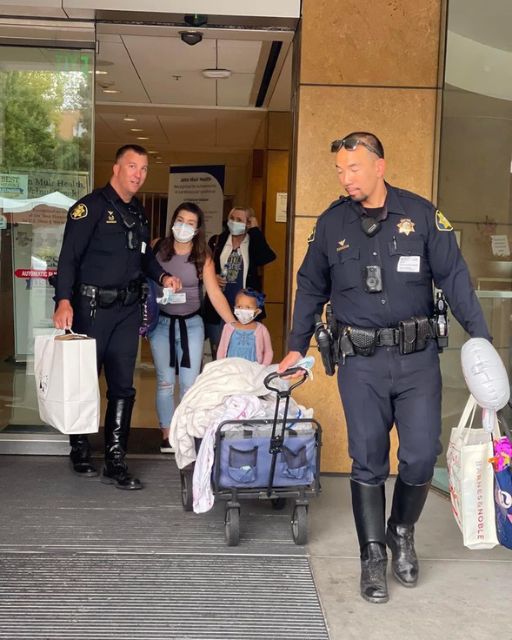After months living in hospital rooms—whispering prayers through clenched teeth, braiding my daughter Callie’s hair as it thinned from treatment—I stood at the exit doors with two duffel bags and no clue where we were going.
Callie, ever the light, waved to the nurses with her stuffed bunny under one arm, her spirit still somehow shining. But the truth? We had no home to return to.The apartment was gone. My job—lost after too many missed shifts and silent apologies. And Callie’s father? He vanished the moment life got hard.
I smiled for her sake. I always did.Then I saw them—two police officers walking toward us. My heart dropped. Had the hospital called about unpaid bills? Were we being turned away from even this?
But a nurse leaned in gently.
“It’s okay. They’re here to help.”
Help. A word I’d forgotten how to trust.
The officers offered to carry our bags. Said they’d take us to a “temporary placement.” I didn’t ask questions. I didn’t have the strength. I just followed, pretending this was normal.
Before we stepped into the van, one officer handed me an envelope. Plain. White. My name on the corner, written in soft, familiar ink.
“Don’t open it until you’re inside,” he said.
Callie, still beaming, whispered, “Mommy, can we get ice cream?”
I smiled through the ache. “Maybe later, sweetheart. Let’s see where we’re going.”The van rolled through the city—past strangers, storefronts, and places that felt just out of reach. Callie marveled at everything. Every puppy, every tree, every flicker of light.
But I couldn’t stop staring at the envelope.
Derek Monroe.
My brother. A name I hadn’t spoken in nearly ten years.
The van pulled onto a quiet street lined with picket fences and porch swings. We stopped in front of a modest blue house. A woman stood on the porch, silver-streaked hair and soft eyes like she’d been waiting for us.“This is your placement,” the officer said. “Mrs. Harper will help you get settled.”
Still stunned, I stepped out, and she greeted me like I was family.
Then the officer nodded toward the envelope.
“Open it.”
My hands shook as I tore it open. Inside was a house key, a folded sheet of paper, and a note written in the same hand I remembered from childhood birthday cards.
This isn’t charity. This is family.
Go to 427 Maple Street.
Everything will make sense there.
—Derek
I couldn’t breathe.
He knew. Somehow, he knew.
Through whispers, social posts, mutual friends—he had been watching from afar. Waiting for the moment I might need him. And when that moment came, he didn’t wait for me to ask. He just acted.
The letter explained it all—he bought the house years ago, hoping one day we’d need it. No rent. No expectations. Just love.
“I wasn’t there when you needed me most,” he wrote.
“But I’m here now. Let me be part of your life again.”
That night, Callie slept in a real bed for the first time in months. Bunny under one arm, lavender sheets tucked around her.
“Mommy,” she whispered. “Is this our new home?”
“Yes, baby,” I said. “It is.”
In the days that followed, the fog began to lift. Derek started small—texts, visits. Then came pizza nights and storytime and board games. He and Callie laughed like they’d known each other forever.
And slowly… so did I.
With his help, I got a part-time job at a bookstore. Callie started school again. And every night, we sat on the porch watching the sun dip behind the trees—not as broken people, but as a family rediscovering joy.
One evening, Derek looked at me and said:
“You were never truly alone. You just had to let someone in.”
I smiled, eyes full of quiet tears.
“I’m glad it was you.”
If you’re reading this and feel like you’re carrying the world by yourself—don’t.
And if you’re the one who can offer help—don’t wait to be asked.Because sometimes, the smallest gesture—a name on an envelope—can lead someone home.
And sometimes, that is all the miracle they need.
